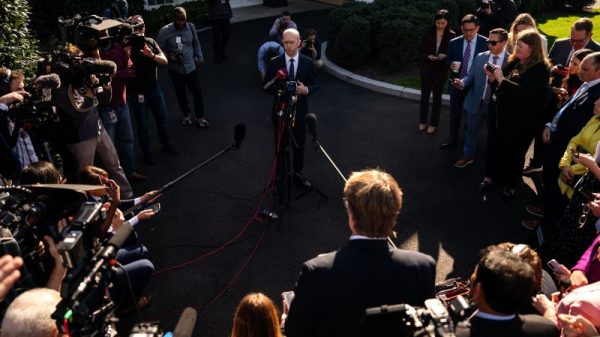Florida Gov. Ron DeSantis (R) on Monday signed strong restrictions against children using social media, following other Republican-led states amid a national push to crack down on minors’ access to online platforms over safety fears.
“You can have a kid in the house safe, seemingly, and then you have predators that can get right in there into your own home,” DeSantis said during a news conference Monday. “You could be doing everything right but they know how to get and manipulate these different platforms.”
The sweeping restrictions prohibit children 13 and younger from creating social media profiles, and requires parental consent for those between 14 and 15. Under the new law, social media platforms will be required to delete existing accounts for children younger than 14 — though account holders will have a 90-day period to dispute terminations. If platforms “knowingly or recklessly” violate the law, they can face up to $50,000 per violation in civil penalties. The bill also bans minors from “pornographic or sexually explicit” websites and requires age verification to access these sites.
Major social media platforms, including Instagram, Facebook and TikTok, require users to be at least 13 — a requirement that stems from the 1998 “Children’s Online Privacy Protection Rule,” which banned the collection of children’s personal data without parental consent. However, a survey published in 2022 by the nonprofit research organization Common Sense Media found an upswing in usage among children ages 8 to 12.
While the bill, H.B. 3, does not specify which social media platforms would be affected by the changes, its text states that it applies to sites where more than 10 percent “of the daily active users who are younger than 16 years of age spend on average 2 hours per day” — as well as those that have “addictive features” such as infinite scrolling and push alerts.
Such habit-forming features, said the state’s House Speaker Paul Renner (R), are “at the heart of why children stay on these platforms for hours and hours on end” — and “nudging them in a very, very dark direction.”
Politicians across the country have taken aim at the ingredients that make social media alluring — that algorithm magic and slew of notifications that make it hard for consumers to turn away from the incoming flood of information. Last year, U.S. Surgeon General Vivek H. Murthy warned that “social media use is associated with harm to young people’s mental health.” And its misuse can increase the risk of children developing anxiety, depression and eating disorders.
Those concerns have spurred a flurry of legislation relating to children’s social media usage that range from bans — like those in Arkansas and Utah — to efforts to bolster media-literacy education. But the push to curb children’s social media use is mostly coming from state legislatures, which have by far outpaced federal legislators in passing laws in that area.
According to a tally by the National Conference of State Legislatures, more than 140 bills on the issue are pending this year across 30 states. Last year, 13 states passed 23 new laws on child safety — which included imposing verification requirements, granting greater parental oversight and limiting children’s social media usage, according to a report by the University of North Carolina’s Center on Technology Policy.
“Of all tech-policy issues covered in this report, states were most active in this area,” according to the researchers. “Both parties ramped up efforts on child safety, but Republican-led states passed four times the number of new laws as Democrat-led states.”
Like similar laws passed in other state legislatures, Florida’s new restrictions — which are set to take effect in January 2025 — are likely to face constitutional backlash over concerns they infringe on free speech and would push companies to collect even more data to verify that children are not accessing their sites. Federal judges temporarily halted similar laws in Arkansas and Ohio from going into effect, citing concerns they may run afoul of the First Amendment.
An executive for NetChoice, a tech industry group that sued to block many of those measures, called Florida’s measure an “unconstitutional law” that “will protect exactly zero Floridians.” The group counts Facebook, Google, Amazon and other tech companies as members. (Amazon founder Jeff Bezos owns The Washington Post.)
“HB 3 forces Floridians to hand over sensitive personal information to websites or lose their access to critical information channels,” NetChoice Vice President and general counsel Carl Szabo said in a statement Monday after DeSantis signed it into law. “This infringes on Floridians’ First Amendment rights to share and access speech online.”
Greg Gonzales, legislative counsel for nonpartisan group Foundation for Individual Rights and Expression, also called the bill “unconstitutional.”
“We urge the states currently considering bills similar to HB 3 to respect the First Amendment rights of their citizens and avoid wasting resources defending an unconstitutional law in court,” Gonzalez said in a statement to The Washington Post. “Protecting children is a laudable goal, but enacting futile and unconstitutional legislation does not protect anyone.”
Though the bill’s proponents said Monday that they predicted an imminent legal challenge, they said they believed the new restrictions could survive judicial scrutiny.
“What’s unique in this bill is we didn’t focus on content,” said Renner, the state House speaker. “You will not find a line in this bill that addresses good speech or bad speech because that would violate the First Amendment.” Instead, he said, the restrictions are aimed at “the addictive technology.”
DeSantis, who earlier this month vetoed an initial and more restrictive version of the bill, said its current iteration — which grants parents greater control over their children’s social media use — “is not engaging in any regulation of speech.”
“We worked hard with the legislature because, at the end of the day, we’re not just here spinning our wheels — we’re not just trying to get a photo,” he said. “We want something that actually sticks and actually has a positive impact, and there was a lot of work that was done to ensure that.”
Nevertheless, DeSantis added: “I think it’s gonna be a challenge. We’ll see how that shakes out.”




























